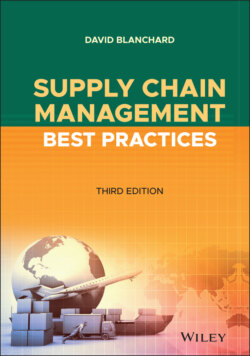Читать книгу Supply Chain Management Best Practices - David Blanchard - Страница 30
What Makes a Supply Chain Leader?
ОглавлениеHere's the good news: Whereas the Singhal/Hendricks study exposes the vulnerability of poorly managed supply chains, another study conducted by Accenture (in partnership with INSEAD and Stanford University) reveals that companies identified as supply chain leaders have a market cap up to 26 percentage points higher than the industry average.6 That begs the question: So what makes a supply chain leader, anyway?
That's where the statistical approach comes in. If you can measure the performance of your supply chain, then you'll be able to determine how close you are to being best-in-class. But how do you know exactly who is the best at supply chain management? When Fortune magazine identifies the top-performing companies in a given industry, it uses the straightforward standard of annual sales. When it comes to identifying the top supply chains, though, merely counting up dollars and cents won't get the job done. After all, a supply chain that is truly best-in-class will encompass numerous operations and processes that don't necessarily show up on a profit-and-loss sheet, such as planning and forecasting, procurement, transportation and logistics, warehousing and distribution, customer service, and other key factors in the overall supply chain equation.
Since 2005, analyst firm Gartner has attempted to quantify the qualities that define “best-in-class” with its annual ranking of the top supply chains. Part of this list is based on a vote from a community of supply chain practitioners and experts, and like most popularity votes, nobody will ever agree with every choice.7 However, the list also factors in three financial metrics that Gartner believes best indicate the overall effectiveness of a company's supply chain: three-year return on assets (net income/total assets), inventory turnover (cost of goods sold/quarterly average inventory), and three-year revenue growth. In 2016, Gartner introduced a corporate social responsibility (CSR) metric as well, based on third-party data. The analyst firm assigns a score to the popular vote as well as to the metrics, and then comes up with a composite score for all the companies (mostly manufacturers and retailers) under consideration.
In the previous edition of this book, we remarked on how inventory turns were the best indicator of a world-class supply chain, at least based on the rankings of the Top 25 Supply Chains of 2009. In that year, three high-tech giants led the way with the most inventory turns: Dell had 46.2, Apple was close behind with 45.5, and IBM had 20.0 turns. Not coincidentally, Apple and Dell also finished at the top in the overall rankings, with IBM finishing in fourth (consumer packaged goods manufacturer Procter & Gamble claimed the third spot).
However, a decade later, the rankings look quite a bit different. Dell and IBM didn't even make the list, while Apple and P&G were moved to a separate list of what Gartner calls “Supply Chain Masters,” i.e., companies so consistently proficient in their supply chain management that they tended to finish in the top five slots year after year after year (and thus, perhaps, made the list a bit too predictable). None of the companies in the Class of 2019 came anywhere close to Dell's 46.2 inventory turns. Chinese online retail giant Alibaba had the highest inventory turn mark among the Top 25 at 23.4 (Alibaba didn't even crack the Top 10, though, finishing at 13). The next-closest was Starbucks at 12.7 turns.
In 2019, the company at the top of the list was consumer packaged goods manufacturer Colgate-Palmolive, whose inventory turns were strictly average at 5.0, but whose return-on-assets score was one of the very best among the Top 25, at 19.9%. Illustrating how the supply chain metrics landscape has changed in just 10 short years, one of the key metrics propelling Colgate to the top spot was its perfect 10.0 CSR score, earned in part due to its “no deforestation” policy.
According to Gartner, following are the top 10 supply chains of 2019:
1 Colgate-Palmolive
2 Inditex
3 Nestlé
4 PepsiCo
5 Cisco Systems
6 Intel
7 HP
8 Johnson & Johnson
9 Starbucks
10 Nike8
